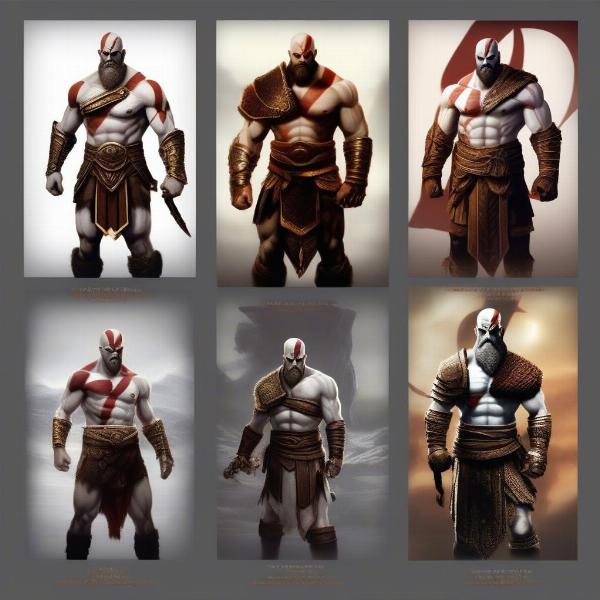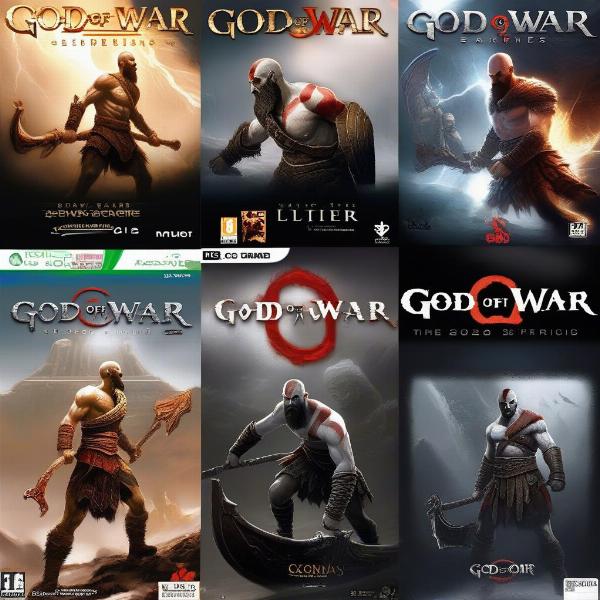Understanding the correct Order To Play God Of War Games can significantly enhance your experience with this iconic franchise. SupremeDuelist.blog is here to guide you through the chronological and release order, ensuring you don’t miss a beat in Kratos’ epic journey. Whether you’re a newcomer or a seasoned Spartan, our detailed guide will help you navigate the series with ease.
This article provides a comprehensive look at the God of War timeline, blending both the narrative and release dates of each game. This allows you to experience Kratos’ journey as intended by the developers while also appreciating the evolution of the gameplay and narrative. So, grab your Blades of Chaos, and let’s dive into the world of gods and monsters.
Chronological Order of the God of War Series
The God of War series boasts a complex and fascinating storyline that spans multiple eras. To fully grasp the narrative, experiencing the games in chronological order is crucial. Here is the order in which the games occur within the storyline:
- God of War: Ascension (2013): Serving as a prequel, Ascension delves into Kratos’ past, depicting his struggle to break free from his oath to Ares. The game’s narrative explores his imprisonment and journey to redemption, making it a perfect starting point for those looking to understand Kratos’ beginnings. It establishes his deep motivations and the pain that drives his rage. This is not necessarily the best way to start for new players, but the best if you want to follow the entire lore closely, although the gameplay is not as refined as the later entries.
- God of War: Chains of Olympus (2008): Originally released on the PlayStation Portable, Chains of Olympus is set before the events of the original God of War. Here, we see Kratos serving the gods and facing the challenges in the ancient world, a stark contrast with his future rage against them. The title adds layers to the narrative and shows Kratos’s earlier exploits.
- God of War (2005): The game that started it all, the original God of War follows Kratos’ quest for revenge after being tricked into murdering his family by Ares. It lays the foundation for Kratos’ hatred for the gods of Olympus, making the game a critical point in the overall narrative, even though is very early in the story timeline.
- God of War: Ghost of Sparta (2010): This PSP title continues to explore Kratos’ past, following his search for his brother Deimos. Ghost of Sparta not only enhances Kratos’ backstory but also further develops the family dynamic and suffering that fuel him. The game expands the mythology and gives more context to Kratos’ motivations, and features great boss fights.
- God of War: Betrayal (2007): This mobile game is a side-scrolling action title set between God of War and God of War II. While it is less widely discussed than the mainline titles, it fills in some gaps between adventures and shows the continuity of Kratos’ journey.
- God of War II (2007): The sequel that elevates the original’s scope, God of War II sees Kratos continuing his battles with the Olympian gods, going through several challenges to change his destiny. It’s a crucial part of Kratos’ early arc, leading up to his major decision to invade Olympus. As many fans know, exploring what ps2 game god of war 2 cheats is one of the most fun moments of the early titles.
- God of War III (2010): The conclusion to the Greek saga, God of War III takes Kratos on a rampage through Olympus, seeking vengeance against the gods. This epic conclusion to the Greek era, delivers great set-pieces and brings Kratos’ anger to its maximum potential. It ties up the loose ends of the previous Greek-era titles.
 Kratos in chronological order within the God of War game series, from Ascension to God of War 3, showcasing his journey
Kratos in chronological order within the God of War game series, from Ascension to God of War 3, showcasing his journey
- God of War (2018): The series’ soft reboot, this title moves Kratos into the Norse realm where he must protect his son, Atreus. This represents a major shift in tone, gameplay, and character development, making it essential to play in the order as its release date. The game showcases his maturity and the new direction for the series.
- God of War Ragnarök (2022): Continuing Kratos’s story in the Norse realms, Ragnarök focuses on the coming of the end of the world and builds upon the bond between Kratos and Atreus. This game completes the Norse storyline that was set up in the 2018 reboot. It provides closure to many of the story threads that were started there. It is also worth considering what will be the next god of war game after ragnarok, according to the many rumors out there, as the world of God of War is huge.
Release Order of the God of War Series
Playing the God of War games in the order they were released is also a viable choice. This order offers a look at how the series evolved over time, both in terms of gameplay and storytelling.
- God of War (2005): The game that launched the series, introducing players to Kratos and his brutal style.
- God of War II (2007): The sequel that built upon the original with more complex gameplay and a deeper narrative.
- God of War: Betrayal (2007): A mobile game that fills some plot points between the first and second games.
- God of War: Chains of Olympus (2008): A PSP title that is set before the first game, expanding the story.
- God of War III (2010): The epic conclusion to the Greek saga, completing Kratos’s revenge arc against the Olympian Gods.
- God of War: Ghost of Sparta (2010): Another PSP title that offers further insights into Kratos’ backstory.
- God of War: Ascension (2013): A prequel that explores Kratos’ origins and his enslavement by the gods.
- God of War (2018): The soft reboot, moving Kratos to the Norse realms, introducing a new gameplay and narrative style. This is a great entry point for new players, as it does not require playing all the previous games.
- God of War Ragnarök (2022): The conclusion to the Norse saga, providing closure to this new chapter in Kratos’ journey.
This order allows you to experience how each entry added to the overall narrative and gameplay improvements through the years. For example, it can give you an appreciation of the work done in titles such as god of war mini game, which might look less sophisticated compared to the modern titles.
Which Order Should You Play?
The question of which order to play depends on your priorities:
- For a Full Narrative Experience: If you are primarily focused on understanding the complete narrative of Kratos’s life, then playing through the chronological order is the recommended path. This lets you see his transformation and progression in the most coherent way.
- For a Look at Gameplay Evolution: If you are interested in seeing how the gameplay mechanics and graphics evolved across the titles, then playing in the release order might be more interesting for you. You can appreciate the technological jumps and narrative direction the team took.
- For a New Player: If you are just starting, the 2018 God of War title is the best place to jump in, as it gives you the full package of great gameplay and narrative, with very few required prerequisites. Then, you can follow with God of War Ragnarök. Afterwards, if you feel compelled to learn more about Kratos’s story, then you can explore the rest of the Greek saga.
 God of War game covers displayed in release date order, showcasing the evolution of the game series
God of War game covers displayed in release date order, showcasing the evolution of the game series
“Starting with God of War (2018) is often the best entry point for new players. It perfectly encapsulates the series’ evolution while providing a fresh perspective,” says Elara Vance, a renowned game critic.
Frequently Asked Questions
Why play the God of War games in order?
Playing the God of War games in order enhances your appreciation for the series’ complex narrative, character development, and gameplay evolution. It allows you to witness Kratos’s journey from his origins as a Spartan warrior to his experiences as a father in the Norse realm.
Is it okay to start with God of War (2018)?
Yes, it’s perfectly fine to start with God of War (2018). This title serves as a soft reboot and offers a fresh entry point for new players, with an engaging narrative and updated gameplay. It does not require knowledge of previous games to be enjoyed.
Where can I play the older God of War games?
The older God of War games are available on their original PlayStation platforms and some through PlayStation Now (now PlayStation Plus Premium). Emulation is also an option, but it’s important to adhere to legal guidelines. It also depends on the generation you are trying to explore, for example, while a god of war game for mobile is possible, it will be a different kind of experience compared to a console or PC game.
“The beauty of God of War lies not only in its action but also in its emotional depth. Playing in order enhances both,” observes Dr. Marcus Sterling, a game design professor.
What’s the difference between chronological and release order?
The chronological order follows the sequence of events in the game’s timeline, while the release order follows the order in which the games were published.
Are the PSP God of War games important?
Yes, Chains of Olympus and Ghost of Sparta are both integral to understanding Kratos’s backstory. They are worth playing for fans of the series.
Conclusion
Choosing the correct order to play God of War games is key to fully appreciate the storyline and gameplay. Whether you follow the chronological or release order, you’re in for an unforgettable experience. Remember, as always, SupremeDuelist.blog is here to guide you through your gaming adventures. Now, go forth, and conquer the realms with Kratos! Let us know which order you chose and how you found it! We are always glad to have you around!
Leave a Reply